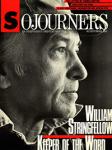There was a time in the early history of the church when prophets were held in unique honor: Their spiritual gifts ranked with those of the Apostles themselves. One second-century document on church order states that if a prophet is present at the Lord's Supper, he or she is the one to preside, as having the most conspicuous endowment of the Holy Spirit.
Today prophets are likely to lead more marginated lives—nervously acknowledged as having something significant to say, but not in a position of power from which to say it. So firm is the church's foundation that it does not budge easily; prophets are not inclined to respect so specific a gravity. For their own part, the guardians of organized religion recognize that there is a prestige factor in having a prophet, but it is more tranquil to have her or him at a little distance.
When William Stringfellow, one of the most authentic prophets of our place and time, died, the writer of his obituary in The New York Times referred to him as "an activist of the '60s." The wording is a sort of distancing in itself: It puts the man Stringfellow into a sort of journalistic protective custody as someone who had a sort of significance back in those wild days.
But for those who recognized him as a prophet, William Stringfellow was a contemporary person in our midst. He was most acutely heard by people who are themselves somewhat marginated: social critics, questioners of authority, anyone sensitized to the abuse of power, anyone who recognizes the idolatry in social standards and political ambition, who cries out against the creeping decay that eats away at institutions.
Through Stringfellow many found their own voices. The Old Testament prophet Joel envisaged an age when prophetic power would flow through young and old, women and men, slave and free. There are such people right now, whose potential for courage was sparked by Stringfellow. They have become questioners of norms and challengers of idolatry. Their presence in the church prompts hope for the future.
Both Karl Barth and Jacques Ellul recognized in Stringfellow a peer in prophecy, one who applied the merciless plumbline of scripture to the jerry-built structures of society. It was he above all, in our place and our time, who held his own church up to judgment:
- He questioned whether members of the House of Bishops could accuse another member of heresy without at first having agreed on what heresy is.
- He questioned whether the church was bearing witness to Christ's inclusive love as long as persons were denied free access to full membership in the body of Christ because of their sexual orientation.
- He questioned the unreserved dedication to the cause of peace of anyone who did not withhold the tax money with which war is made.
- He asserted that the ordination of women does not represent full enfranchisement as long as access to office is more difficult for women than for men.
- He deplored the cheapening of the concept of "spirituality" to the point that it means anything from breathing exercises to "squatting on a pillar."
- He regretted that the terms "charism" and "the charismatic" have been preempted by one segment of the church; "charism" properly designates any gift of the Spirit, including the gift of administrative skill. A "charismatic," in his scripturally based definition, is anyone who places her or his spiritual gift in the service of the church.
His was a clear, challenging voice on issues such as these. It not only got attention, but it evoked a prophetic response in others. To put the point in theological terms, the Holy Spirit has heuristic power: By means of prophecy, it generates prophecy and holds up to judgment anyone using the gift unwisely. I know many courageous witnesses to the truth who were called forth by this compelling man.
For all who were empowered by him in the cause of peace and justice, William Stringfellow was a touchstone of authentic testimony to scriptural faith. His legacy is the spark of his fire that helps keep our own ministries alight.
H. Coleman McGehee Jr. was bishop of the Episcopal Diocese of Michigan when this article appeared.

Got something to say about what you're reading? We value your feedback!
